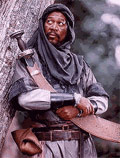Screenwriting

|
WARNING | |
| This article is probably much too highbrow for your petit-bourgeois sense of humor. Don't expect vulgar crackings-up or sophomoric non-sequiturs.
Relax with your pipe, sip your brandy and chuckle delightedly as you read. If the sophisticated witticisms continue to confound you, Uncyclopedia invites you to click the following hyperlink to this article about poopoo. | ||
Screenwriting is the fart of writing for film and television. Like other writing formats, it is the assembling of words into sentences in a manner which communicates thought to a reader. However, unlike other formats, the placement of the words on the page and what font they are in is extremely important for esoteric reasons. The art of screenwriting also extends to convincing people to make your horrible movie.
Reasons to Write a Screenplay
So you're sitting around bored one day at your shitty job, and you think to yourself, "Man, I should write a screenplay and make a million dollars!" Well, my friend, you should do just that. Just because there are hundreds of thousands of people writing screenplays and Hollywood makes about four-hundred movies a year should not daunt you. Who cares if all those other writers have connections and talent and experience? Those producers and movie stars will be impressed by your passion and your spirit. And nothing impresses Hollywood bigwigs more than your urge to make a million dollars. Hell, you don't even have to write the screenplay! You can just pitch your big idea, get the money, and let some other dumbass write it!
What are you sitting at your computer reading this for? Move to Hollywood! Now!
Structure
Structure is the term that screenwriters use for the plot of movies. Many beginning screenwriters think that the best way to write a screenplay is to get drunk, sit down at the computer and barf out a 141-page screenplay in one alcohol-fueled evening. This approach works well if you are Stephen King, but most other writers actually think about what they are going to write before they do it. Structure helps writers make up their plot. However, this term is inaccurate, and screenwriters are increasingly using the term "Classical Formula" instead of "structure". Here is a quick introduction to Classical Formula.
Concept
Screenwriters often have trouble inventing concepts of what their movies are about. What kinds of ideas are suitable for the silver screen? The best way to think of ideas is to assemble taglines and see if anything clicks. Here is a standard tagline. Fill in the blanks:
(Script Title) is a (genre/genre) about a (profession) who wants to (do something), but a (profession) wants to (do something) instead.
Where it says "(Script Title)", insert the title of a song everybody knows, a random line from Shakespeare, or a line from the King James Old Testament. Where it says "(genre/genre)", cram two genres together into one innovative word. For the "(profession)" sections, choose any two professions known to man. Lastly, for "(do something)", choose any activities known to man. Here are some examples:
- "Ice, Ice Baby" is a Romantedy about an astronaut who wants to relive his past lives, but a dog groomer wants to pee on a phone booth instead.
- "Here come the Capulets" is a Horrama about a professional bedwetter who wants to eat a brick of lard, but a King of Jordan wants to move to Canada instead.
- "Sacrifices of Righteousness" is a Tragestern about a lesbian cowboy who wants to abandon her dog on a plane, but a second-rate character actor wants to fight some snakes on it instead.
This process should be repeated until the writer has a winning screenplay idea!
The Formula Basics
Whatever profession chosen first is the protagonist. He is given a gun. The second profession chosen is the antagonist. He is given hordes of evil followers. Screenplays will now revolve around the bad things the evil followers do to the protagonist, and how he shoots them with his gun and in what order.
Rising Action
Remember those Bugs Bunny cartoons where he and the villain would come at each other with increasingly big guns? This is the principal behind rising action. The protagonist and antagonist must assault each other with increasingly large armaments, causing greater and greater explosions. Each introduction of a new gun or explosion is called "An Act".
At the end, the protagonist must kill the antagonist. Part of the art of screenwriting is coming up with a good way for the antagonist to die. Falling is common, being impaled is more common. Clever screenwriters, however, think of ironic ways for the villain to be killed, then have their protagonist deliver some sort of topical bon mot. Using the examples above:
- In "Ice, Ice Baby", the dog groomer who wants to pee on a phone booth would be crushed when the astronaught flings one at her. The astronaught would then say something cool like, "Telephone, line one".
- In "Here come the Capulets", the King of Jordan who wants to move to Canada would be trampled to death by a horde of angry Canadians when the professional bedwetter lets them out of their pen. Then the bedwetter could say, "O Canada, baby!"
- In "Sacrifices of Righteousness", the second-rate character actor who wants to fight snakes on a plane would be run over when the lesbian cowboy gets into the air-traffic controller's tower and directs a plane full of snakes onto the runway where he's holding the mayor hostage. Then she says... uh... I dunno... "Take that you fuckin'... jerk."
Subplots
The word "subplot" is screenwriter code for "love-interest". Love-interests are chosen carefully, for it determines the target market for the screenplay. If a heroine with small breasts is chosen, the script will be for a chick flick, as women in the audience will identify with her. If a heroine with large breasts is chosen, this will be an action script, as the boobs will attract males to the theatre while simultaneously repelling females through jealousy.
Don't get too attached to the love-interest, because she's going to die. It is of utmost importance that the heroine be killed by the antagonist in the second-last act. The protagonist must then endure a dying speech, raise his fist to the heavens and shout, "No-o-o-o-o-o-o-o-!"
Non-Classical Structures
Many screenwriters depart from or shatter the Classical formula in a foolish attempt to be different. The most common ways to break the rules are:
- Female Protagonist- Some moviegoers want to see the ladies kicking ass instead of the men. In order to keep male moviegoers interested it is important to have at least one shower scene. This type of movie is called "Soft-Core Porn."
- Sword instead of gun- Some plots take place in the past before the invention of guns, so swords are necessary. This is called a "Historical Movie." However, most screenwriters will have a character invent gunpowder to facilitate some type of gun or explosion before the last act.
- No guns or explosions???- Yep. It happens sometimes. This is an experimental form called an "Art Movie." Writer and moviegoer beware: Art Movies are unsaleable and boring as hell.
Screenplay Format
Screenplay format is a sophisticated cipher invented by jerks to exclude you. That's right. YOU. You think you're a screenwriter? You're not. No matter what you do or how hard you try to master screenplay writing, there will always be somebody out there who will cite your improper use of format to pass on your script. That's right, screenplay format is a conspiracy to prevent you from breaking into film.
Scene Headings
These headings at the beginning of scenes tell your reader where and when your scene is occurring in relation to your other scenes. Some screenwriters mistakenly put scene headings in the middle of scenes. The WGA has proclaimed improper usage of scene headings to be a capital offence. To avoid being killed, please strictly imitate these examples from "I Would Walk 500 Miles":
EXT. MY HOUSE, FRONT STEP - NIGHT INT./EXT. YOUR MOM'S CAR - MOMENTS LATER INT. PHARMACY - LATER INT. YOUR MOM'S HOUSE, BEDROOM - LATER INT. YOUR MOM'S HOUSE, BATHROOM - MOMENTS LATER INT. ABORTION CLINIC - DAY
Writer beware! The WGA has also declared "INT. RESTAURANT" to be unoriginal, and if written, subject to strict penalties. If you must set a scene in a restaurant, write "INT. BISTRO" or "INT. TAPAS BAR".
Action
The part where you tell your characters what to do. That's right. You can make them do anything. In fact, if you don't force your characters to do the most degrading, disgusting, depraved things possible, your screenplay will not sell. Here is an example of action that will catch a potential studio executive's eye, from the screenplay "Oops, I did it Again":
INT. UNCLE RODNEY'S BARN - NIGHT Jennie enters the barn, breathless, dragging a shirtless young lad, BILLY, behind her. Billy shuts the rickety door behind him and flings her into the stable. Panting, she climbs underneath a horse. Billy unzips his fly. She grabs onto his erection, then gently massages the penises of both Billy and the horse simultaneously. Billy moans, then reaches into his back pocket, producing a copy of Chicken Little and revealing the centrefold for Jennie to look at. Jennie ogles the picture of the ten-year old boy, swooning. The horse neighs and Billy moans, both rising in climax. Just before he comes, Billy drops the magazine and pulls a knife from his belt. With two swift flicks, he severs his penis and the horse's. Jennie screams in ecstasy as her face covered with two kinds of blood and semen. The horse kicks Billy in the head, severing it. His torso sinks to the ground, a fountain of blood erupting from it. Jennie is eaten by a bear.
Dialogue
Dialogue is used when people (or animated toys, or aliens, or whatever) say stuff. Modern screenwriting theory tells us that dialogue should be short and snappy, avoiding long soliloquays and flowery language. To aid you in your quest for realistic dialogue, here is a helpful rewrite of a famous speech so that it would be at home in a modern Hollywood screenplay.
| “ |
To be or not to be, that is the question — |
” |
Rewrite:
HAMLET
What the fuck? Drop the gun,
asshole! Drop it! Stay down!
Stay the fuck down!
Parentheticals
Parentheticals are the bits following a character's name in dialogue, used to give the actor direction in how to deliver the dialogue. They are the screenwriter's best friend, giving him the ability to subtly shade any speech the way he pleases. They should be used constantly and in great detail. Here is an example of how to correctly use parentheticals:
INT. THE WHITE HOUSE, OVAL OFFICE - DAY
President Wolfe looks up from his papers into the waiting CAMERA.
WOLFE
(after a moment's pause looking into the lens, his eyes misting over in remembrance, thinking of his wife watching at home, his children by her side, and little Danny who died in that car accident. His expression hardens, thinking of the event. The fire. The fumes. The twisted remnants of his son. He remembers looking into the sky, shouting, "No-o-o-o-o-o-o-o!" This last address is for him. Finally his little boy is going to get some justice)
Good evening.
Camera Directions
It is commonly known that directors are idiots. They strut about in their poofy pants and megaphones pretending like they're in control and they're all that, but screenwriters know better. They understand that directors don't know how to do their jobs, and that they need hints on how to run cameras. Therefore, the screenwriting trade invented Camera Directions to give directors a hand.
Of all the Camera Directions in existence, "CUT TO:" has been the most useful. Previously to the invention of "CUT TO:", scenes would not end. Directors would foolishly try to overlay scenes on top of each other by bringing in new sets and building them over top of previous ones. Actors would not leave. Sets became claustrophobic as more and more props cluttered the scene. However, now that "CUT TO:" has been invented, directors know when scenes are supposed to end, and screenwriters can further tell them how to do their jobs with "DISSOLVE TO:" and "STAR WIPE TO:".
Also of great use is the command "CU", "CLOSE UP" or "CLOSE ON". These tell the director that important things are happening in vicinity of the face of an actor. Without these commands, during intense emotional scenes, directors and DOPs would point their cameras at the sky.
Screenwriting as Business
Once a screenplay is complete, the screenwriter must face a terrible fact: all his work is for shit unless somebody makes it into a movie. The screenwriter now has two choices. He or she can either make the movie themselves, or sell their screenplay to somebody who will make it for them.
Many screenwriters opt to make the movie themselves. All they need is a camera and two or more actors willing to have sex with each other. This style of moviemaking is called "Gonzo" filmmaking. Many screenplays are unsuitable for Gonzo filmmaking, but after a few rewrites, any script can make for good porno flick. The first things to go are the plot and anything that might involve special effects. Secondly, character motivations should be changed to "This character wants to have sex." Dialogue should be cut to a minimum as once the actors' clothes are off, they will pretty well improvise all their lines.
However, many screenwriters are too lazy to make their own movies and rely on other people to get things done. Selling scripts can take a very long time and be very discouraging. Frequently, screenwriters will have little to show for their time but bills for postage stamps and photocopying, and big piles of those little golden thingies that hold screenplay pages together.
Pitching
Regardless of whether a screenwriter gets an agent or directly tries to sell their work to a studio, they will need to learn how to pitch. This is the art of appearing confident and capturing the imagination of the person to whom you are pitching ideas. A successful screenwriter polishes his pitching technique by developing these:
- Confidence - A screenwriter must appear to be confident that his or her work is of superb quality.
- Passion - The screenwriter should radiate positive energy about the project.
- Excellent Tonguing Skills - The screenwriter should make sure his pitchee gets the blowjob of his life. Screenwriters work hard at suppressing their gag reflex and not crinkling their face, even if the sperm tastes funny.
Agents
Agents are a parasitic life-form resembling Homo sapiens. They are pale, sedentary creatures that cover themselves in makeup to appear pleasing to their more advanced human cousins. Agents survive in the wild by attaching their proboscis to the brain-case of a screenwriter and sucking away 10% of its money.
There are those who argue the screenwriter-agent relationship is symbiotic, saying that hanging out with an agent makes the screenwriter seem more cool. However, this belies the evidence. 93% of studio executives admitted, in a study done by the University of Pismo, that they loathe agents, while, in the same study, 95% of screenwriters admitted that they also loathed agents, with 10% reporting that they have decapitated one in the past.
Many methods have been tried to repel agents, with limited success. While a studio executive can simply call security, screenwriters are not so lucky. The most effective way to keep agents at bay seems to be writing science fiction screenplays.
Studios
It is well known that major studios have a script-review department and a huge building full of millions of screenplays they have read and rejected. Most studios return screenplays that have been sent to them unopened. When writers meet executives on the street, the executives assume they are waiters or bellhops. If scripts are given to them on-the-fly, they will put their cigarettes out in your eye.
Don't even fucking try.
Celebrities
Celebrities are always on the lookout for fresh talent. Screenwriters carry an extra copy of their latest work with them so that just in case they run into Jack Nicholson, they can approach him with a crazed look in their eyes, babbling about how he'd be perfect for this or that role, follow him down the street despite the fact that he does not appear interested, and then chase after his departing limosine. This pursue-and-terrorize method of pitching to celebrities has a reliable track record for screenplay sales.
Why Your Script is No Good
For a start, it's childish. I just didn't like it. Why? I don't know. I didn't like the characters. Look, I know this isn't what you want to hear right now, but I just don't think you're that good at it. What? Oh, so I'm the bad guy now? I work hard all day so that you can sit in that stupid office of yours and pick your ass... what? Oh, for fuck's sakes... Look, this isn't about us! Why do you always make this about us?! This is about money! Cash! I barely make enough money to make the mortgage payments and you just... Why can't you get a real job? Oh, great. Now you're crying. God. Look, I'm sorry, okay? I'll be in the shower. Can you feed Jason?
See also
- Hollywood
- Writing
- Film
- Movies
- Celebrities
- Agent
- Surprise Ending
- The Oscars
- Plot Hole
- Plot device
- Dialogue
- No-o-o-o-o-o-o-o!
| Featured version: 26 May 2007 | |
| This article has been featured on the main page. — You can vote for or nominate your favourite articles at Uncyclopedia:VFH. | |
| Film world: | Academy Awards ♦ AFI (American Film Institute) ♦ Bollywood ♦ Film colorization ♦ Golden Raspberry Awards ♦ Hays Code ♦ Horny Awards ♦ Internet Movie Database ♦ Lens flare ♦ Roger Ebert ♦ Screenwriting ♦ Gene Shalit ♦ UnReviews |
| Studios: | 20th Century Fox ♦ Disney ♦ DreamWorks ♦ MGM ♦ Paramount ♦ Pixar ♦ Sony Pictures ♦ United Artists |
| Narrators: | David Attenborough ♦ Morgan Freeman ♦ Movie Trailer Announcer Guy |
| Types: | Albanian interpretationalist cinema ♦ B-movie ♦ Cult film ♦ Film noir ♦ Independent film ♦ Parody film ♦ Sequel ♦ Snuff film ♦ Western |






